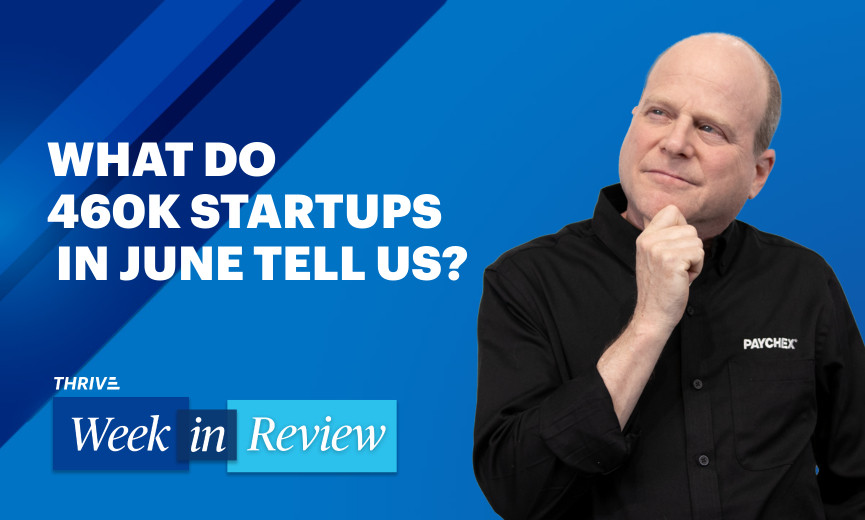- Thrive
-
Temporada
4Episodio196
Las preocupaciones principales de las pequeñas empresas, la IA en el proceso de contratación y el impacto positivo de la reducción de la semana laboral
Podcast •
Vea
Resumen
Inflation, tax policy, and cost of living top the list of concerns for small businesses. Gene Marks shares results of the survey. He also talks about the impact of AI technology on the recruiting process and the pitfalls to avoid in response to business owners expressing how they plan to use AI to weed through resumes. And, if you’ve longed for a shorter work week, there are some positive results – if you want to move to Iceland.
Ver transcripción
Hey everybody, it's Gene Marks and welcome to another episode of the Paychex THRIVE Week in Review. This is the podcast where we go over three bits of news from the week that impact your small business and mine and we talk about it just a little bit. So, let's get right to the news, shall we?
The first bit of news comes from a survey that was published by GoDaddy this past week, and it talked about what was most important to small businesses as we head into next week's election. And there are three big things that are most important to small businesses, and I think that we should all agree with, but hopefully want to make sure that you're aware of them, as well. And, by the way, this survey was taken of more than 2,000 small businesses around the country.
The first is inflation. Ninety-three (93) percent of the survey respondents said that they were impacted by inflation over the past few years, and that remains a big issue. We know that inflation is coming under control, but at the same time, we are dealing with costs that are much higher than they were just, you know, 2 or 3 years ago. So, that's number one.
Number two is tax policy. We are heading into a Tax Armageddon – those are my words, nobody else's – but we are going to have big potential changes in taxes depending on how the elections turn out. Fifty (50) percent of the business owners surveyed ranked tax reform as their top policy priority, so that is also a big issue. And that also makes sense considering how much we pay in taxes every year.
Finally, it's just the overall cost of living. The cost of housing. The cost is impacting people's incomes. It's impacting their employees, as well. Nearly one out of every three respondents said that the cost of living is having a negative, you know, negative effect on their income and their employees’ income – more women than men also felt that that was true.
So, top three issues that we head into the elections that GoDaddy is reporting inflation, tax policy, and the cost of living.
Let's go to our next story, which comes from Forbes. This is a Forbes’ story that was based on another survey that was taken by a company called Résumé Builder of nearly 1,000 business leaders in October and it has to do with AI, and are you ready for this headline here? Sixty-five (65) percent of all employers plan to use AI to reject candidates in 2025.
Let me just read this out to you. Based on the findings of this eye-opening survey, it appears that AI usage in hiring will become more frequent than job candidates might find comfortable and can be used across more aspects of the hiring process, especially as companies ramp up their hiring plans and attract vast numbers of applicants globally.
So, there are number of AI recruiting applications that are out there. Many of them offer features where you can record an employee's interview and, you know, in advance. And some of these AI applications are not only making some assumptions about that employee's responses to answers, but also, how they are during the interview; their eye ticks, their facial expressions, their voice tones. Obviously, more employers are going to be using that in 2025.
My only advice to you there is be very, very careful. Some states, in particular New York state and others in this country have laws about using AI in the recruiting process because there is bias involved. Just remember, AI applications are written by humans, and humans are inherently biased. So, you want to be very, very careful if you're going to be using an AI application in your recruiting, particularly if you're going to be using it to reject employees in 2025 and the years after that.
Which brings us to our last story. And this story this week comes out of Iceland. It was reported on CNN.com. And are you ready? Iceland has embraced a shorter workweek and it has had a positive effect on their economy. Let me read this to you. Iceland's economy is outperforming most European peers after the nationwide introduction of a shorter working week with no loss in pay. This was according to research that was released last week.
Between 2020 and 2022, 51% of workers in the country had accepted the offer of shorter working hours, including a four-day week. Two think tanks found that the figure is likely to be even higher today than those 51%. Last year, Iceland logged faster economic growth than most European countries, and its unemployment rate is one of the lowest in Europe.
In 2023, Iceland's economy expanded by 5%, a growth rate second only that of Malta among rich European countries, according to the International Monetary Fund's latest World Economic Outlook, which was published last week.
So, less hours, a shorter workweek and a better economy – huh! Something that might be considered more and more by employers here in the United States.
My name is Gene Marks, and you have been watching or listening to the THRIVE Week in Review podcast. If you need any help or advice or tips in running your business, please join us and subscribe to our Paychex Thrive newsletter. Go to paychex.com/thrive.
Thanks for watching or listening. We'll see you again next week with another episode. Take care.
This podcast is property of Paychex, Incorporated 2024. All rights reserved.

 Apple Podcast
Apple Podcast Spotify
Spotify iHeartRadio
iHeartRadio









